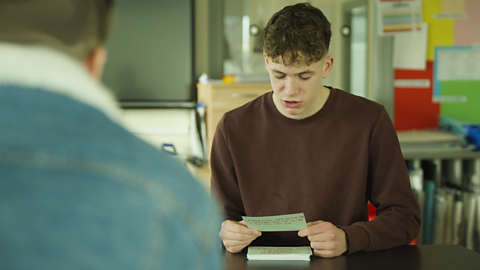Whether you're taking GCSEs or National Qualifications, revision season is upon us! You're bound to have lots of burning questions about how to get started and the best techniques to use. Don't worry – you've got this and we've got you! See below to hear some common FAQs from students, along with advice from teacher Ben Wardle and links to where you can find more help and support.
How should I plan my revision?
You'll want to think about when you're going to revise, says Ben, and not just what you're going to revise. You'll need a revision timetable (see below!) and it can be helpful to have a revision checklist too. Watch the video to hear some more tips from Ben and for more help and support, visit our Exams and revision collection.
When you are planning your GCSE revision, there are two things to consider. Number one is when you will revise and number two is what you will be revising. So let's start with when you will revise, and my advice is to sit down and create a revision timetable that works for you. So make sure it includes all of your subjects and make sure it is manageable. You can then decide what you will be revising for each subject, and my advice here is to create a revision checklist for each subject, and then you can tick off each topic as you revise it. This is also a great opportunity to identify any areas of weakness or gaps in your knowledge, and you can then go away and do some extra research and work on that topic.
How do I make a revision timetable?
To help organise your revision, it's a good idea to make a timetable. Ben says the important thing is to make sure it's manageable and works for you. There's more advice from Ben in this video and in our timetables and planning article on Bitesize Study Support, including an example timetable and a blank template to help you make your own.
Revision timetables really help organise your GCSE revision, make sure that yours is manageable and that it works for you. It needs to include all of your subjects and how you will be revising. For example, on Monday at five o'clock, you're doing geography paper two retrieval practice, and on Tuesday at five o'clock you're doing English paper one path paper questions.
When should I start revising?
Well, Ben's advice is that if you haven't started yet, now would be a good time to get cracking! The earlier you start, the less overwhelming it will be and the more time you'll have to really consolidate your learning. Starting early will also give you more chance to revisit any tricky topics. See below for more tips from Ben and there's more help and advice in our How do I get started with revision? article.
The right time to start your GCSE revision is right now, and that's because the earlier you start revising, the more time you will have to revisit difficult topics, and this is called spaced retrieval practice. When you keep revisiting the same topic over time, and this will help to strengthen your understanding of that topic and to then secure that knowledge in your long term memory so you can then recall it in the exam room.
How many hours a day should I revise?
The answer to this, says Ben, depends entirely on you! We're all different and we all work in different ways. The trick is to create a timetable that works for you and allows you plenty of time to do the fun stuff too. Here's Ben with more tips and here you can find out Why taking study breaks is a good thing.
How many hours to revise each day all depends on you because we are all different and work in different ways. So create a revision routine that works for you. And also remember that quality is just as important as quantity. Focus on those high quality revision techniques that will help you secure those grade nines, including retrieval practice, past paper questions and teaching other people the content as well.

If you need support
You should always tell someone about the things you’re worried about. You can tell a friend, parent, guardian, teacher, or another trusted adult. If you're struggling with your mental health, going to your GP can be a good place to start to find help. Your GP can let you know what support is available to you, suggest different types of treatment and offer regular check-ups to see how you’re doing.
If you’re in need of in-the-moment support you can contact Childline, where you can speak to a counsellor. Their lines are open 24 hours a day, 7 days a week.
There are more links to helpful organisations on BBC Action Line.

Revision: How to stay motivated
Just how do you stay motivated whilst revising?

How do I get started with revision?
How to get started with your revision.

Revision: How to get organised
Advice on how to get organised with your revision.
